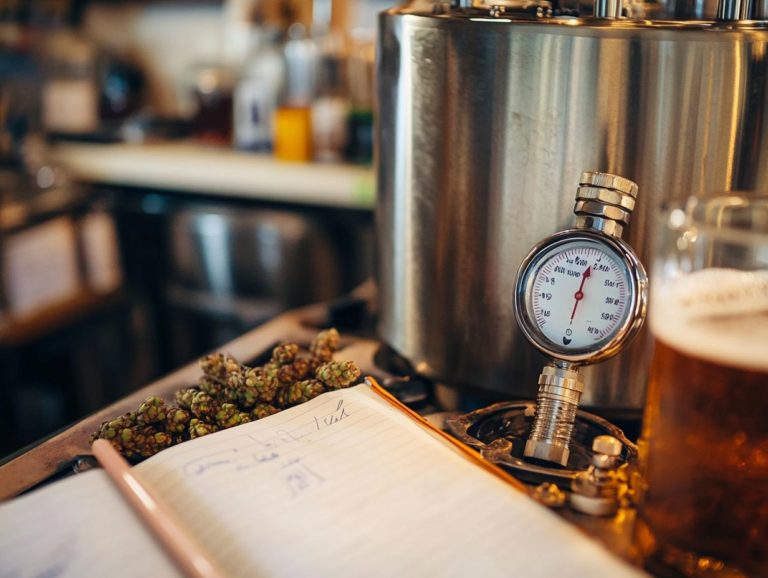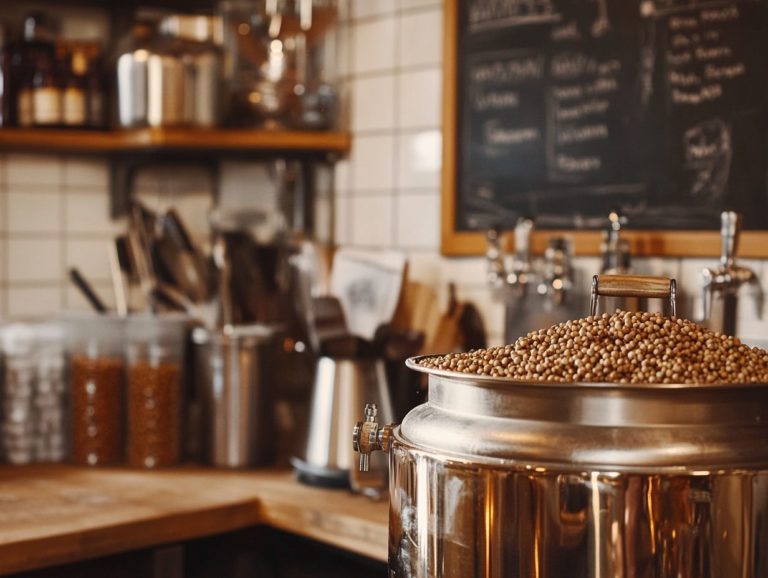Home Brewing Tips for Reducing Waste
Home brewing is a truly rewarding pursuit that enables you to create your own distinctive beverages; yet it often conceals hidden waste that can affect both your finances and the environment.
This article delves into the significance of waste reduction in home brewing, drawing attention to common culprits from excessive water consumption to the management of raw materials.
Uncover practical strategies to lessen your ecological footprint, accompanied by insightful tips for proper waste disposal.
Embrace the opportunity to cultivate a more sustainable brewing experience!
Contents
- Key Takeaways:
- Why Should You Reduce Waste in Home Brewing?
- What Are the Common Sources of Waste in Home Brewing?
- How Can You Minimize Waste in Home Brewing?
- What Are Some Tips for Reducing Waste in Home Brewing?
- Effective Waste Disposal in Home Brewing
- Frequently Asked Questions
- Waste Reduction Tips for Home Brewing
Key Takeaways:

- Minimizing waste in home brewing not only helps the environment, but also saves money and resources.
- Common sources of waste in home brewing include water usage, energy consumption, and raw materials.
- Some tips for reducing waste in home brewing include planning ahead, buying in bulk, and using recycled or reusable materials.
Why Should You Reduce Waste in Home Brewing?
Reducing waste in home brewing is crucial for embracing eco-friendly practices that not only lessen the environmental impact of your brewing endeavors but also elevate the sustainability of your hobby.
As you become more aware of your ecological footprint, integrating sustainable ingredients, optimizing water usage, and implementing effective waste reduction strategies can make a significant difference for our planet.
Furthermore, these practices cultivate a sense of community within the brewing world, fostering collaboration among fellow homebrewers who share your dedication to responsible beer production.
What Are the Common Sources of Waste in Home Brewing?
In the world of home brewing, you may encounter several common sources of waste that can seriously affect both the efficiency and sustainability of your brewing process. If not managed carefully, water usage can lead to excessive waste, while energy consumption might result in brewing emissions that harm the environment.
Additionally, the quality and quantity of raw materials you choose, such as hops and yeast, play a crucial role in waste levels, especially concerning spent grains and other byproducts. Recognizing these challenges is essential for any homebrewer who aspires to embrace more sustainable practices.
1. Water Usage
Water usage is a pivotal aspect of home brewing, influencing not only the brewing process but also playing a significant role in water conservation efforts. As a homebrewer, you likely consume substantial amounts of water across various stages, including mashing, boiling, and cleaning. If not managed effectively, this can lead to unnecessary waste.
However, by embracing strategies such as rainwater catchment systems, you can significantly reduce your reliance on municipal water supplies and align your brewing practices with sustainable principles.
Grasping the significance of each component of water can lead to enhanced brewing outcomes, allowing the flavors and aromas to truly shine in your final product. By adopting proactive water management techniques, you foster a harmonious relationship between your craft and the environment.
Many homebrewers have successfully implemented systems to collect rainwater, which can be filtered for cleaning equipment or even utilized during the brewing process itself.
These innovative practices not only reflect the creativity inherent in the brewing community but also underscore a wider commitment to sustainability. Every step you take to minimize water wastage whether through efficient usage or cutting-edge conservation strategies elevates your craft and positively impacts local ecosystems.
2. Energy Consumption
Energy consumption in home brewing significantly contributes to waste. It impacts your brewing efficiency and the sustainability of the brewing community.
Heating water, boiling wort, and maintaining fermentation areas generate substantial carbon emissions, especially with non-renewable energy sources.
Switching to energy-efficient equipment and exploring renewable energy can greatly reduce your environmental footprint. This transition allows you to enjoy a more sustainable brewing lifestyle.
Not only does this benefit the planet, but it also improves the quality of your brew. It enhances temperature control and consistency throughout the brewing process.
Many homebrewers have reported success using electric kettles with temperature sensors or installing solar panels to power their brewing setups.
For instance, insulated fermentation vessels reduce the need for heating and cooling. They help maintain ideal fermentation temperatures with less energy.
These examples show that achieving energy efficiency in home brewing is possible. It can lead to superior brews while strengthening community sustainability efforts.
3. Raw Materials
Raw materials are essential in home brewing. The sourcing and use of these ingredients profoundly influence the quality of your beer and the brewing process’s sustainability.
Selecting sustainable ingredients like locally sourced hops and organic grains enhances your beer’s flavor profile and reduces waste from transportation and packaging.
Managing spent grain highlights your commitment to responsible brewing and promotes a positive environmental impact.
Understanding raw materials means recognizing their influence on your brewing experience. Sourcing locally supports farmers and reduces your carbon footprint critical in today s eco-conscious climate.
Choosing organic options avoids harmful pesticides and fertilizers. This results in a cleaner brewing process and a healthier product.
If you want to maximize your brewing, consider creative uses for spent grain, such as baking bread or feeding livestock.
This commitment to sustainability enhances your beer’s quality and fosters a circular economy within the brewing community.
How Can You Minimize Waste in Home Brewing?

Minimizing waste in home brewing is crucial for a sustainable brewing environment. It helps conserve resources and promotes eco-friendly practices.
You can adopt strategies for reusing materials, enhancing energy efficiency, and implementing sustainable methods. This approach significantly lessens your environmental footprint.
Examine everything from your brewing equipment to your cleaning routines. Ensure every aspect of your process is tuned for minimal waste and maximum efficiency.
1. Reuse Water
One of the most effective strategies for minimizing waste in your home brewing is to adopt methods that allow you to reuse water throughout the brewing process. Collect and repurpose water used during various stages, such as rinsing your brewing equipment or cooling your wort. By doing this, you can significantly reduce your overall water use. Embracing water conservation techniques not only diminishes your environmental impact but also enhances the sustainability of your brewing hobby.
For example, collect the cooling water after it has chilled the wort. This water can be reused for rinsing equipment or even for watering your garden plants. Explore rainwater collection systems for a sustainable water source for your brewing needs. Utilizing leftover water from the cleaning process or saving water used for boiling grains contributes to a more eco-friendly approach.
By implementing these practices, you conserve precious resources and foster a culture of responsibility and respect for the environment among fellow enthusiasts.
2. Use Renewable Energy Sources
Using renewable energy sources is an exceptional way to enhance energy efficiency in your home brewing while minimizing waste and your environmental impact. By harnessing solar, wind, or other renewable energy options, you can power your brewing equipment sustainably, significantly reducing your reliance on fossil fuels. This transition lowers your brewing emissions and aligns with a broader commitment to sustainable practices within the brewing community.
Adopting these green technologies can lead to substantial cost savings over time. For instance, consider installing solar panels to generate power for your brewing processes, effectively slashing your electric bills.
Explore wind turbines or biogas systems to transform waste byproducts from brewing into a renewable energy source. There are inspiring examples, like a local Homebrewers Association club that has successfully transitioned to solar energy, showcasing reduced costs and a strong commitment to environmental stewardship.
This shift strengthens the brewing community and inspires new brewers to embrace eco-friendly practices in their own homes, such as using sustainable and local ingredients.
3. Reduce Raw Material Waste
Reducing raw material waste is vital for promoting sustainability in home brewing, especially in managing spent grains and other byproducts. As a homebrewer, adopt practices that minimize waste by using sustainable ingredients and repurposing spent grain for applications like animal feed or composting materials. This approach fosters a circular economy within the brewing process and enhances the environmental impact of your home brewing, including reducing water usage.
Integrate strategies like using spent grains in baking or crafting unique snacks to further decrease your waste output. Explore partnerships with local farms for grains used in animal feed to help reduce landfill contributions and support local agriculture, showcasing your commitment to community sustainability and organic options.
Using high-quality, sustainably sourced ingredients boosts flavor and reduces your overall environmental footprint. In this manner, cultivate a brewing practice that is both satisfying and conscientious, positioning yourself as a true steward of the environment. Experimenting with organic ingredients and eco-friendly brewing methods can enhance your brewing joy and lifestyle.
What Are Some Tips for Reducing Waste in Home Brewing?
- Plan ahead and purchase ingredients in bulk.
- Opt for recycled or reusable materials to minimize your environmental impact.
- Compost leftover ingredients to enhance waste reduction and promote resource conservation.
- Incorporate your own yeast culture for better brewing emissions.
Start implementing these tips today to make a positive impact on the environment!
1. Plan Ahead
Planning ahead is an essential strategy for you to reduce waste in home brewing. This proactive approach enables you to streamline your processes and optimize resource usage. By thoughtfully considering the brewing process and scheduling, you can minimize excess ingredients and avoid unnecessary waste, ensuring that every component is utilized effectively. This approach not only fosters sustainability but also elevates your overall brewing experience.
For instance, creating a detailed brewing schedule enables you to manage your time more efficiently and ensures that you purchase ingredients in the right quantities. Utilizing a recipe calculator helps you achieve precise measurements, preventing the overbuying of malts or hops. By planning your brew days around the fermentation schedule, you can better track your ingredients, significantly reducing the chances of spoilage.
Incorporating practices like batch brewing making several batches at once or scaling recipes adjusting the ingredients based on the amount you want to brew leads to improved resource management, allowing you to create more while consuming less. Don’t miss out on using a fermentation chamber; it can greatly enhance your brewing control!
Ultimately, this thoughtful planning makes brewing more enjoyable and impactful, transforming it into a rewarding and environmentally conscious craft, making every brew day something to look forward to.
2. Buy in Bulk

Buying in bulk is a savvy strategy for reducing waste in home brewing, allowing you to save money while minimizing packaging waste that comes with individual purchases. By sourcing sustainable ingredients in larger quantities, you can streamline your brewing process and support eco-friendly practices within the brewing community. This approach benefits not only the environment but also elevates the overall quality of the beer you produce, contributing to better brewing sustainability.
When you purchase ingredients in larger volumes, you often enjoy lower prices per unit, making it a financially astute choice for the brewing enthusiast. This commitment to bulk buying means fewer trips to the store, ultimately reducing the carbon footprint associated with transportation. Consider sourcing your ingredients from a homebrew supply store to further enhance your inventory.
By choosing bulk purchases, you embrace a more sustainable lifestyle and cultivate a deeper appreciation for the raw materials at your disposal. This connection to your ingredients can spark experimentation and innovation in your brewing techniques, fostering a vibrant community grounded in sustainability. Contributing to brewing sustainability, you can also explore using rainwater catchment systems for your water needs.
3. Use Recycled or Reusable Materials
Utilizing recycled or reusable materials presents an effective strategy for waste reduction in home brewing, as it minimizes the need for new resources while also curbing overall waste generation. You can repurpose items like bottles, kegs, and brewing equipment, which not only helps cut costs but also fosters a more sustainable brewing environment. This approach cultivates a culture of resource conservation within the brewing community, inspiring others to embrace similar eco-friendly practices. Consider integrating energy efficiency in your brewing equipment to further enhance your sustainable practices.
For instance, many brewers choose glass bottles that they can clean and reuse multiple times instead of splurging on new ones. Similarly, by refurbishing old kegs, you can significantly reduce both material costs and waste. Consider exploring food-grade buckets and containers repurposed from local bakeries or restaurants for fermentation and storage, thus extending the lifecycle of these materials. Such practices can be reinforced by a Homebrewers Association that promotes sustainable brewing techniques.
Engaging in such practices not only contributes to minimizing waste but also enhances the sense of community among homebrewers. You’ll find that sharing tips on where to source reusable supplies fosters a collective commitment to sustainability in your craft, bolstering the overall brewing joy within the community.
4. Compost Leftover Ingredients
Composting your brewing leftovers is an exciting way to reduce waste and create something valuable! Composting leftover ingredients from your brewing process is a fantastic way to manage waste while contributing to a more sustainable brewing environment. As a homebrewer, you can utilize composting materials such as spent grains, hops, and other organic matter. This practice transforms what would typically be discarded into valuable resources for your garden and soil enrichment.
This practice not only reduces landfill waste but also helps you forge a deeper connection with the brewing community and promotes responsible waste management. By recycling those potential waste materials, you significantly minimize your impact on the environment and enhance the health of your garden.
Composting generates nutrient-rich soil amendments that improve plant growth and yield in your garden while positively impacting the local ecosystem. This can be particularly effective if you have a rainwater catchment system to support your gardening efforts.
To compost effectively, layer carbon-rich materials like dried leaves or straw with nitrogen-rich brewing residues. Ensure proper aeration (adding air) by turning the pile regularly. Incorporating kitchen scraps can diversify your compost, making it even more beneficial. Consider adding spent grain and hops to your compost pile for further enrichment.
Engaging in this practice cultivates a more sustainable approach to brewing and enables you to give back to the environment.
Effective Waste Disposal in Home Brewing
Proper disposal of waste in home brewing is crucial for promoting environmental sustainability and minimizing your impact on the environment throughout the brewing process. As a homebrewer, you should prioritize the recycling of glass and plastic materials, ensuring they are diverted from landfills and repurposed effectively.
Consider composting organic waste, such as spent grains and hops. Also, make sure to dispose of any chemicals or hazardous materials responsibly. Your composting efforts will boost waste management in the brewing community and showcase your commitment to a greener future. Explore using energy-efficient brewing methods to further mitigate your impact.
1. Recycle Glass and Plastic
Recycling glass and plastic materials is an essential component of responsible waste disposal in home brewing. These materials can be repurposed and reused rather than finding their way into landfills. You should make a dedicated effort to separate recyclable materials from regular waste, ensuring that bottles, containers, and plastics are disposed of responsibly.
This can also include a proper cleaning routine for your brewing equipment to ensure longevity and reuse. This practice not only bolsters waste management initiatives but also promotes a culture of recycling within the brewing community.
Participating in community brewing events can further encourage these sustainable practices. By properly handling these materials, you can significantly reduce your environmental footprint as a homebrewer.
Consider establishing a designated recycling station, clearly labeling bins for glass and plastic to streamline the process. Before discarding these items, it’s crucial to rinse away any food or beverage residues, as contaminants can complicate recycling efforts.
By nurturing mindful recycling habits, you contribute to a more sustainable brewing process while helping alleviate the overall strain on waste management systems. Such efforts create a healthier environment, ultimately benefiting not just your brewing endeavors but the community as a whole.
2. Compost Organic Waste
Composting the organic waste from your brewing process is a great way to manage waste. It also fosters a more sustainable brewing environment.
As a homebrewer, you can easily compost spent grains, hops, and other organic materials. This transforms what could be waste into valuable compost that enriches your soil and supports your gardening efforts. This practice minimizes the amount of waste heading to landfills and promotes a circular economy within the brewing community, emphasizing sustainable practices.
To set up a successful composting system, begin by choosing a dedicated compost bin or pile in a shaded, easily accessible spot in your yard. It s crucial to strike a balance between green materials, like kitchen scraps and spent hops, and brown materials such as dry leaves and straw to create the ideal compost mixture. Keeping an eye on moisture levels and regularly turning the pile will help accelerate decomposition. Incorporating rainwater catchment systems can also aid in maintaining the right moisture levels.
By embracing composting, you can significantly reduce your carbon footprint. Start today and watch your garden thrive while generating rich compost that enhances plant health. This allows your brewing ingredients, including sustainable and local options, to flourish and contributes to a vibrant ecosystem around you.
3. Properly Dispose of Chemicals

Properly disposing of the chemicals you use in home brewing is essential for ensuring environmental safety and promoting responsible waste management practices. As a homebrewer, you should be well-informed about the correct procedures for disposing of hazardous materials, like cleaning agents and chemical sanitizers, to prevent contamination of land and water sources. Using eco-friendly cleaning agents can further enhance your waste reduction efforts.
By adopting safe disposal methods, you can reduce the environmental impact of your brewing activities. This contributes to a healthier brewing community. Proper waste management is key to maintaining a balanced brewing environment.
Your responsibility extends beyond just yourself. It fosters a culture of environmental stewardship within the brewing community. Educating yourself on local regulations regarding hazardous waste disposal and exploring eco-friendly options whenever possible is crucial. This includes using organic ingredients and biodegradable products.
Using biodegradable cleaning agents significantly reduces harmful runoff. Properly recycling or taking unwanted chemicals to designated disposal facilities can further protect local ecosystems. Adopting a routine cleaning process helps manage waste more efficiently.
By consistently adhering to these guidelines, you ensure compliance with legal requirements. You also enhance your reputation as a conscientious member of your community, demonstrating a true commitment to sustainability. This commitment supports community brewing efforts and fosters a collaborative brewing lifestyle.
Frequently Asked Questions
What are some home brewing tips for reducing waste?
To reduce waste while brewing, use reusable equipment. Compost leftover grains and yeast, and store ingredients correctly to prevent spoilage.
Why is reducing waste important in home brewing?
Reducing waste helps lower the overall environmental impact of home brewing. It can also save money by minimizing the need to constantly purchase new equipment and ingredients.
How can I use reusable equipment in my home brewing process?
Invest in high-quality, durable equipment such as stainless steel brewing kettles, silicone tubing, and glass fermenters. These can be used multiple times rather than disposable options. Be sure to clean and sanitize equipment properly after each use to prolong its lifespan. Visiting a brewing supply store can help you find the best home brewing equipment for your needs.
Waste Reduction Tips for Home Brewing
What can I do with leftover grains and yeast from home brewing?
Leftover grains and yeast can be composted to reduce waste. They also provide nutrient-rich compost for your garden or plants.
Alternatively, you can use leftover grains in cooking or baking recipes. Yeast can be frozen for future use.
Donating spent grains to local farms for animal feed is another eco-friendly option.
How can I properly store and preserve ingredients to reduce waste?
Invest in airtight containers to store grains, hops, and other ingredients. Keep them in a cool, dry place away from sunlight.
This will help prevent spoilage and extend the shelf life of your ingredients. This reduces the need to constantly purchase new ones.
Using a fermentation chamber can help keep the best conditions for storing ingredients.
Are there any home brewing techniques that can help reduce waste?
Practicing “closed system brewing” minimizes waste by using a single vessel for brewing and fermentation. This reduces the need for multiple equipment and transfer processes.
Using a wort chiller can also help save water by quickly cooling down the wort. This reduces the need for excessive water usage during the brewing process.
Incorporating rainwater catchment systems can greatly boost your water conservation efforts. Don t miss the chance to make your brewing process more sustainable!






